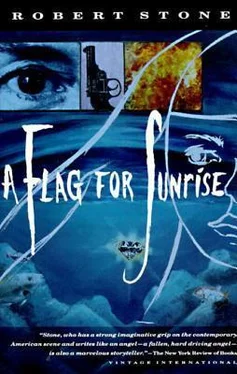Robert Stone - A Flag for Sunrise
Здесь есть возможность читать онлайн «Robert Stone - A Flag for Sunrise» весь текст электронной книги совершенно бесплатно (целиком полную версию без сокращений). В некоторых случаях можно слушать аудио, скачать через торрент в формате fb2 и присутствует краткое содержание. Год выпуска: 2012, Издательство: Vintage, Жанр: Современная проза, на английском языке. Описание произведения, (предисловие) а так же отзывы посетителей доступны на портале библиотеки ЛибКат.
- Название:A Flag for Sunrise
- Автор:
- Издательство:Vintage
- Жанр:
- Год:2012
- ISBN:нет данных
- Рейтинг книги:4 / 5. Голосов: 1
-
Избранное:Добавить в избранное
- Отзывы:
-
Ваша оценка:
- 80
- 1
- 2
- 3
- 4
- 5
A Flag for Sunrise: краткое содержание, описание и аннотация
Предлагаем к чтению аннотацию, описание, краткое содержание или предисловие (зависит от того, что написал сам автор книги «A Flag for Sunrise»). Если вы не нашли необходимую информацию о книге — напишите в комментариях, мы постараемся отыскать её.
A Flag for Sunrise — читать онлайн бесплатно полную книгу (весь текст) целиком
Ниже представлен текст книги, разбитый по страницам. Система сохранения места последней прочитанной страницы, позволяет с удобством читать онлайн бесплатно книгу «A Flag for Sunrise», без необходимости каждый раз заново искать на чём Вы остановились. Поставьте закладку, и сможете в любой момент перейти на страницу, на которой закончили чтение.
Интервал:
Закладка:
“You want to go out on a meat trip, Kathy? Just you and all those ratburgers all over hell?”
“Oh, God,” she whispered. “Oh, Pab.”
He was thinking that when he had pressed the safety the thing was as good as done. If I moved, he thought, it would be like the dogs.
“Shall I count off for you? You want to read one of them Jehovah books before you go out?” He reached behind him and pulled a little chair nearer the bed and sat down on it. “No use in getting out of bed, baby. ’cause it’s good-night time.”
He watched her mouth convulse as she tried to breathe, to speak. Like the dogs, he thought.
A fecal smell rose from the covers; he lifted them and saw the bottom sheet soiled with bile. He covered her again.
“You fuckin’ little pig,” he said wearily.
The voice broke from her trembling body.
“Baby,” she said. “Oh, baby, please.”
He stood up and put the gun down on the chair. From his wallet he took two singles and dropped them on her covers.
“That there’s for all the good times,” he told her, and picked up the gun and put it in his pocket.
She was still screaming and sobbing when he went out with his bag. It was like a bad dream outside — the traffic on the highway just shooting on by, the derricks across the highway up and down up and down. Craziness. He was weak in the knees; he put the bag in the back seat and walked to the playground to call his son.
“Hey, you gonna drive me now, Daddy?”
“Looks like I ain’t today. I gotta go somewhere, so you can just hang out and play.”
“Neat,” the boy said. “You ain’t goin’ to sea, are ya, Daddy?”
“Yeah, I am,” Tabor said. “The South Sea.”
He leaned on the wire fence and took a deep breath.
“You be good to your mother, hear? She needs you to be real good to her.”
“Yes, sir,” the boy said.
At Miami Airport, Holliwell had a change of planes.
Inside he found the Gateway to the Americas number in full January ripeness. It was not a gloomy scene; the crowds of tourists were cheerful enough. There were abrazos and reunions, an unselfconscious flaunting of native pottery and palm straw hats. But under the fluorescent vaults, Holliwell began to sniff out the old curse, to see around him the gathering of a world far from God, a few hours from Miami.
He spied it in small things. A purple jewelry bag lying among butts and spittle in an urn ashtray. A Cuban checking the wall clock against his Rolex. Actual fear in the eyes of a chic South American woman, as she clutched at the sleeve of her plump young son, to the pocket of whose preppy blazer a Parker pen was neatly clasped.
Of course it was all in the mind. He was tired and anxious. But as he made his way through the crowds toward the Aerochac desk, the brightly lit corners began to reek of poverty and revenge, the drawling Spanish in the general din to sound of false-bottomed laughter.
On the wall behind the Aerochac desk was the mask of a Mayan rain god, unsoundly engineered into a pair of wings. The desk was deserted. Holliwell set his bag down and turned to face the passing crowd.
He was seeing the lines go out, past the carved coconuts and the runways, from the Gateway to the lands of stick shack and tin slum, to the small dark man with the hoe, upon whose back, as in a Mayan frieze, Miami Airport rested. To the contrabandist and the grave robber, the mule, the spook, the esmeraldo , the agent.
On the edges of the crowd, hippies with yellow eyes passed — and raw-faced contractors, up for toothpaste and the dog races. Beside a litter bin, some sport had dumped his pennyworth of moldering funny money. The soiled notes lay faded red and blue, each one displaying some full-jowled exemplary of the Republican ideal in braided uniform and tricorn hat, on each obverse some arcane fit of Napoleonic heraldry — the National Bird, Aborigine, Volcano. Thirty cents’ worth of bad history, waiting for a black man with a broom.
When the Compostelan clerk appeared and confirmed his reservation, Holliwell carried his bag to a changing room off the toilets and changed from his Stateside clothes into a seersucker suit and a navy sport shirt. His carry bag repacked, he went to the bar and sat in its midday darkness drinking bloody marys.
The bar he had chosen was filled with Swedes and from such of their conversation as he could make out he surmised that some of them had been to Cuba. They were talking about Havana and Matanzas and sugar. As his eyes became accustomed to the light, he saw that the Swedes sneered a great deal at what was around them — great equine Nordic sneers that distended their fine nostrils. They addressed the Cajun waitress in Spanish and ordered juicy fruit booze concoctions. Holliwell drank beside them until nearly plane time. The drink encouraged him.
His frisk at security made him think of Tecan.
By the time he had settled into his seat in the compartment of Aerochac’s hand-me-down DC-8, he was pleased to be under way. The compartment smelled of duty-free perfume and bug spray. The stewardesses fingered their eye makeup and phonetically recited their English greetings and instructions. The other passengers were Compostelan ladies returning from their shopping trips, a few young tourists and bankers — there were always plenty of bankers traveling to Compostela.
Flying out over the Keys, Holliwell had another bloody mary and went to sleep; somewhere between the Gulf and the Belizean coast, he had a dream.
The dream took place in a house that was large and old, a cold northern house in which there was only one lighted room. He himself was standing in a shadowy hallway and beside him was a woman colleague with whom he had once had an affair and who had killed herself in Martha’s Vineyard nearly five years before. They were whispering together; they were afraid and guilty as they had been in fact.
In the lighted room was a fireplace where no fire burned and on the mantelpiece above it a metal letter file full of opened envelopes and the letters that had been inside.
“What is there to be afraid of?” Holliwell asked the woman beside him.
“You don’t understand,” she said.
As they watched from the dark hall, a middle-aged black man in a postman’s uniform walked into the lighted room and began leafing through the letter file.
Holliwell walked forward; he felt cheerful, amused, almost high.
“I think that’s my mail,” he told the postman.
“Is this your house, too?” the man asked him.
Holliwell became annoyed and confused. He denied that it was, but he felt uncertain.
“Talk to that man,” the postman told him.
The man to whom he was directed to talk was not in sight, but Holliwell knew who it would be. A navy cook he had seen in Danang; he remembered the man’s apron and service hat but the face was a blank. He had a great reluctance to talk to that man, or even to see him. He was afraid.
Somewhere in the house a dog began to bark.
“They think I’m a Communist,” Holliwell called to his friend.
“Of course they do,” she said. Alive, she had a habit of smiling in exasperation when people did not understand something she considered obvious.
The dog kept barking
“If they raid the place,” Holliwell said in alarm, “they’ll shoot the dog.”
Then he woke up and they were circling Belize City, preparing to land. From the air, the city looked much more pleasant than it actually was. The sea beside it was a gorgeous light green; the sparkling beaches down the coast were crescents of summery sunlight.
Holliwell frowned out at the tropical abundance, recalling his dream. It was a variation on one he had been having, intermittently, for several years. It always felt the same.
Читать дальшеИнтервал:
Закладка:
Похожие книги на «A Flag for Sunrise»
Представляем Вашему вниманию похожие книги на «A Flag for Sunrise» списком для выбора. Мы отобрали схожую по названию и смыслу литературу в надежде предоставить читателям больше вариантов отыскать новые, интересные, ещё непрочитанные произведения.
Обсуждение, отзывы о книге «A Flag for Sunrise» и просто собственные мнения читателей. Оставьте ваши комментарии, напишите, что Вы думаете о произведении, его смысле или главных героях. Укажите что конкретно понравилось, а что нет, и почему Вы так считаете.












